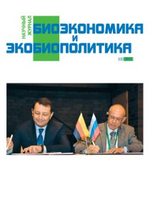Morphogenetic Effects of N-Docosahexaenoyl Dopamine on Pc12 and C6 Cell Lines
Авторы: Акимов М. Г., Ашба А. М., Грецкая Н. М., Зинченко Г. Н., Безуглов В. В.
Рубрика: Тезисы
Опубликовано в Биоэкономика и экобиополитика №1 (1) декабрь 2015 г.
Дата публикации: 30.01.2016
Статья просмотрена: 16 раз
Библиографическое описание:
Morphogenetic Effects of N-Docosahexaenoyl Dopamine on Pc12 and C6 Cell Lines / М. Г. Акимов, А. М. Ашба, Н. М. Грецкая [и др.]. — Текст : непосредственный // Биоэкономика и экобиополитика. — 2015. — № 1 (1). — URL: https://moluch.ru/th/7/archive/20/678/ (дата обращения: 25.04.2025).
N-docosahexaenoyl dopamine (DHA-DA) is a member of the class of endogenous signal lipids N-acyl dopamines. These substances elicit a wide range of responses from cell death induction in cancer cells to membrane excitability modulation and neuron protection against various stressful conditions. DHA-DA was also demonstrated to have morphogenetic effects in regenerating freshwater hydra being endogenous for this species. However, the mechanisms of this effect, as well as its relevance to mammalian cells, were never investigated. The aim of this work was to study possible morphogenetic effects of DHA-DA on nervous tissue related PC12 pheochromocytoma and C6 glioma cell lines upon long-term stimulation.
C6 and PC12 cells were grown according to the ATCC recommendations; in some experiments, serum was avoided from the medium. For the experiments, cells were seeded in 96-well or 6-well plates at the density of 500 cells/cm2 and incubated with various concentrations of the test compounds for up to 10 days. Cell medium with the test compounds was changed every 3 days. Cell viability was assessed using the MTT test. Cell morphology was evaluated using phase contrast light microscopy. Gene expression was analyzed with RT-PCR using commercially available kits.
After 1 day long incubation DHA-DA induced cell death both in C6 and PC12 with LD50 values 12±2 and 4±2 μM, accordingly. The long-term incubation with the LD50 of these compounds did not lead to an increased cell death, but rather revealed cytostatic action on the survived cells. In addition, the morphology of these cells significantly changed: cell bodies enlarged and long processes appeared (2-3 per cell for C6 and 3 or more for PC12). Differentiation marker (NSE, beta-3 tubulin, GFAP, MBP) expression analysis of the cells with the changed morphology revealed astrocytic differentiation in C6 cells and neuronal differentiation in PC12 cells. The differentiation was reversible; after 3 days in the medium without the compounds cell morphology returned to the norm and the cells started to divide. The obtained data may have relevance for the nervous tissue regeneration process.
The work was partially supported by the Russian president grant MK-3842.2015.4.







